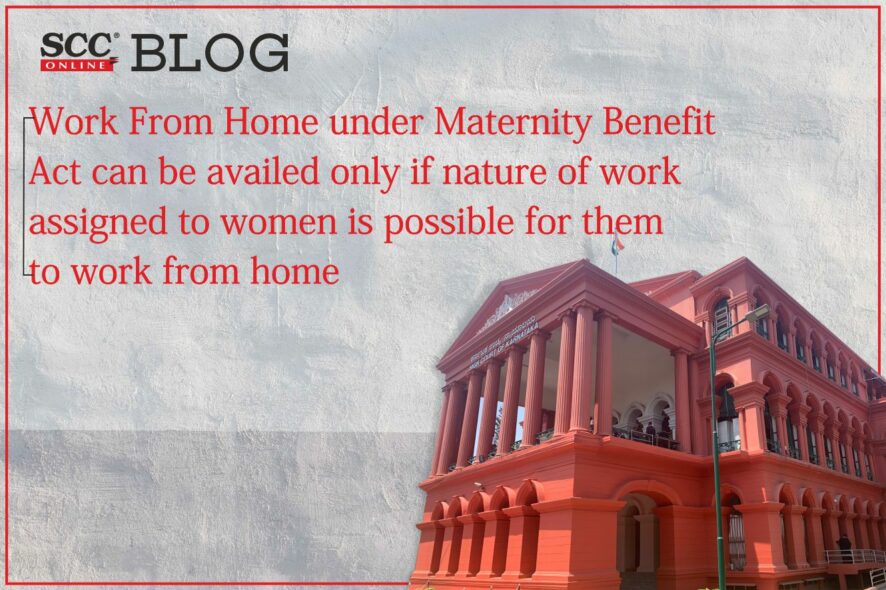Karnataka High Court: Noting that the nature of work assigned to a woman cannot be carried from home, R Devdas, J., held that, as per Section 5(5) of the Maternity Benefits Act, 1961 work from home after availing the maternity benefit could be given only in a case where the nature of work assigned to the women is such that it is possible for her to work from home.
Factual Background
The petitioner delivered a baby girl in August 2020 and was on maternity leave till February 2021.
Further, the petitioner contended that during the second wave of COVID-19 and the lockdown announced by the Government of Karnataka, the petitioner was given benefit along with other employees, to work from home during the lockdown period.
Respondent-Organization did not deny the fact that the petitioner’s attendance was regularized. However, when the petitioner did not join duty after the sanctioned leave was exhausted, the impugned communication was issued to the petitioner stating that she was staying away from duty without sanction of leave and overstay without sanction of leave would be treated as unauthorized absence.
It was also informed to the petitioner that disciplinary action could be initiated against her for willful absence from duty after expiry of the leave period sanctioned by the Management.
Petitioner pointed out the benefits that were required to be provided to a woman under maternity, and two official Memoranda, which provided for grant of child care leave to women employees having minor children below the age of 18 years.
Analysis, Law and Decision
High Court expressed that the petitioner was not able to point out any specific provision of law or rules that would mandate the respondent-organisation to grant childcare leave facility as is available to the Central Government employees, to the employees of STARC.
Bench made reference to Section 5(5) of the Maternity Benefits Act, 1961, it was evident from the said provision that maternity benefits such as work from after availing the maternity benefit could be given only in cases where the nature of work assigned to the women is such that it is possible for her to work from home.
It was noted that the premises of respondent-Organisation was sensitive and involved with risk due to usage of chemicals and toxic gases and the employees working were involved in research work which was both sensitive as well as complicated. Hence, the said work of the petitioner cannot be carried on from home.
During the proceedings, this Court noted that by the impugned communications issued by the respondent-Organisation, the petitioner warned about unauthorized absence and the consequence of willful disobedience.
The Bench stated that the Court cannot lose sight of the fact that during the period of delivery and post-delivery, there were two serious waves of COVID-19 pandemic, firstly, which commenced during the month of March 2020 and for a prolonged period lockdown was announced by the State Government. The second wave commenced from April 2021. This Court would take judicial notice of the fact that there was a third wave in the month commenced from November-December 2021.
Therefore, if the petitioner was unable to join the duties, the respondent-Organisation was required to have a sympathetic view toward the petitioner.
High Court opined that although the prayer made by the petitioner regarding the grant of child care leave could not be granted, however, liberty was reserved to the petitioner to make fresh representation regarding the unauthorized absence and seek regularization of the same.
In view of the above, the petition was accordingly disposed of. [Prachi Sen v. Ministry of Defence, WP No. 22979 of 2021 (S-RES), decided on 3-3-2022]
Advocates before the Court:
For the Petitioner: Beena P.K., Advocate
For the Respondent: H. Jayakara Shetty, CGC For R1 to R4








Informative post